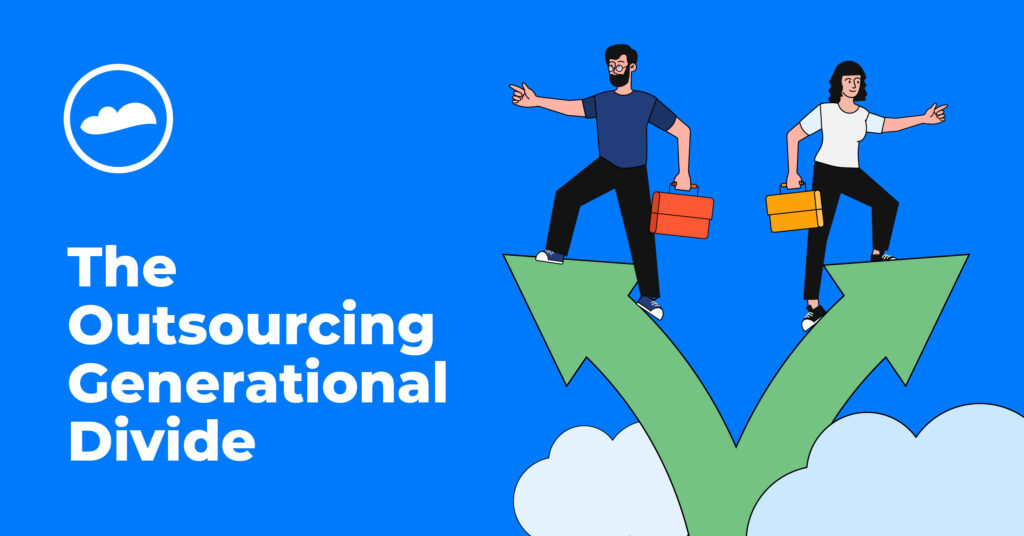In today’s global economy, outsourcing has become an effective strategy to access cost-effective talent and resources from different regions of the world. However, this approach is not free from debates and criticisms, especially through the varying lenses of each generation.
Baby Boomers (born between 1946–1964), Generation X (1965-1980), Millennials (1981–1996), and Generation Z (1997–2012) are working side by side. Each age group has their own set of attitudes, values, and expectations shaped by their experiences and different significant events during their lifetimes.
For instance, older generations are known for their values of hard work, dedication, and loyalty. They find job security and stability the most important. The younger generations, on the other hand, are more interested in flexibility, work-life balance, and company culture.
One of the examples of the workplace attitude differences among age groups is how they view “hustle culture.” This term refers to working beyond your work hours and neglecting your well-being in the belief of achieving success by doing so.
LinkedIn polled their own Gen Z community – 60% disapprove of hustle culture and 86% of them believe that there is no correlation between hustle culture and financial freedom.
This may be one of the reasons why there’s a rise of what they call “quiet quitting” among the younger generation. Harvard Business Review defines the term as a phenomenon where employees are less psychologically invested in work and only fulfilling their main responsibilities.
While older generations see hustle culture as a badge of honor despite its threats to mental health, the younger generations are more open and transparent in taking care of their own well-being.
This just shows that there’s a huge contrast in workplace preferences among generations. Outsourcing is not out of the question.
What do the different generations think about outsourcing?
We conducted a survey in the US, UK, and Australia and uncovered an interesting trend that the younger generations are more likely to consider outsourcing compared to the older generations.
In Australia, 57% of the Millennials see outsourcing as a feasible option for employment while only 20% of the older age group do.
AU shows a promising number of positive opinions on remote staffing, but the United States and the United Kingdom exhibits a more favorable outlook. 71% (US) and 63% (UK) of the younger group would consider offshore employment, while only 23% (US) and 16% (US) and 23% (UK) would from the senior generation.
Across all three regions, Millennial managers are most likely to say that recruitment is a time-consuming process (Australia 73%, UK 68%, US 74%). They find writing job descriptions, placing ads, conducting interviews, and organizing onboarding tedious.
In comparison, older managers are least likely to find the recruitment process time-consuming (Australia 48%, UK 33%, US 42%).
Now that there’s a global talent shortage, outsourcing has become a more attractive option. Many businesses are struggling to find the perfect staff for their organization. Remote staffing does not only help organizations to save costs, it also gives them access to a wider pool of professionals.
What does it imply?
By 2025, it is predicted that Millennials will represent more than 70% of the global workforce. With their unique preferences and approaches, they are changing the way we work and changing the business landscape.
Millennials are comfortable with remote work and virtual collaboration as they have grown up along with the rise of technology. This is just one of the many reasons why they see remote staffing as a viable tool for employment.
When it comes to work, the younger generation values work-life balance more than anything else. With the continuous development of technology, it’s now possible to work from anywhere. This gives them more flexibility and the opportunity to work with diverse colleagues – exposing them to different work styles that they can adopt for career growth.
Fostering a positive and inclusive work culture that caters to all age groups is one thing, but adopting strategies that the new generation of workforce finds appealing is one of the best ways to achieve longevity in the market.
Cloudstaff delivers next-generation outsourcing
The workplace is continuously evolving. The next generation of leaders are climbing the corporate ladder and they have a more global point of view and a more pragmatic approach in recruitment. The best way to find the right talent and thrive in the market is to embrace a strategy that’s readily available and can lead you to success.
Cloudstaff can support your business and provide solutions that can help you overcome recruitment challenges – providing you with flexibility, cost savings, and the right people for your business. Talk to us today to learn more.

